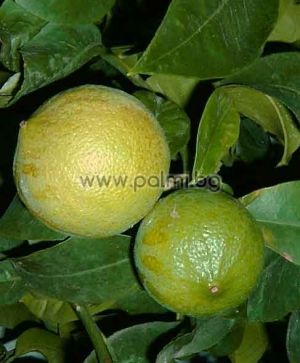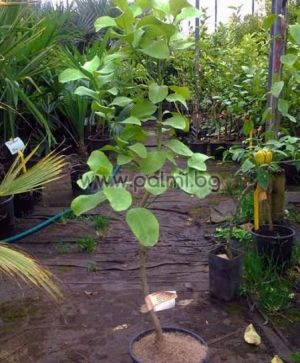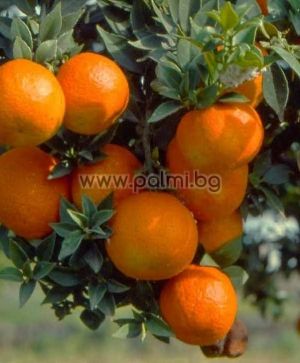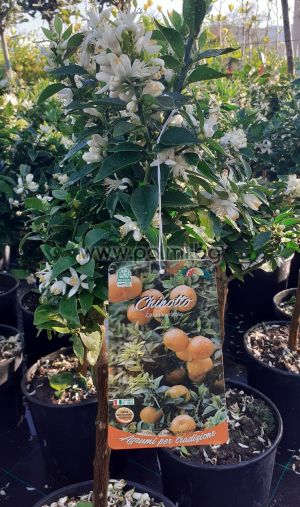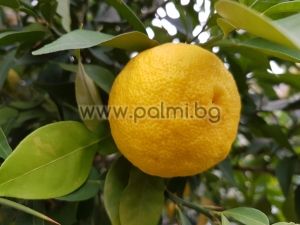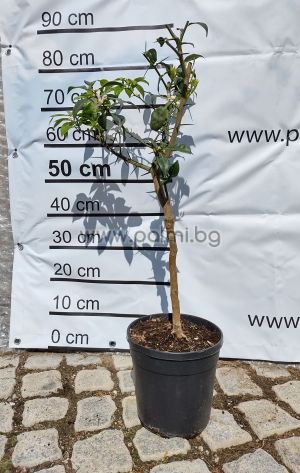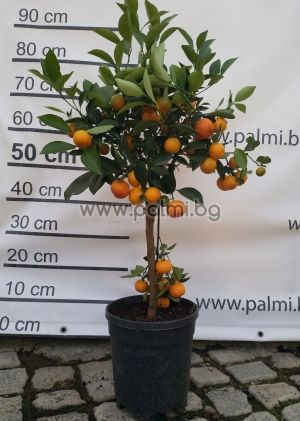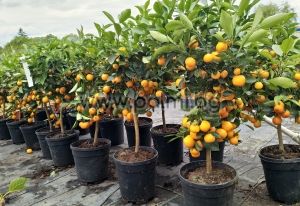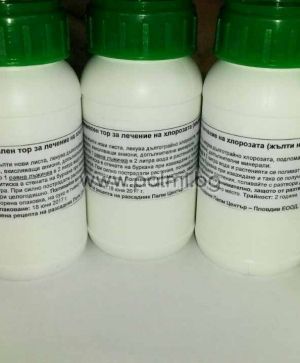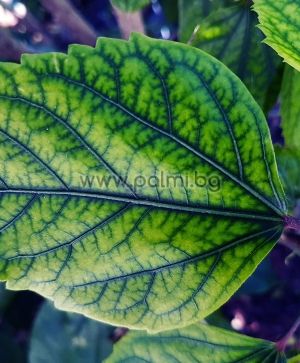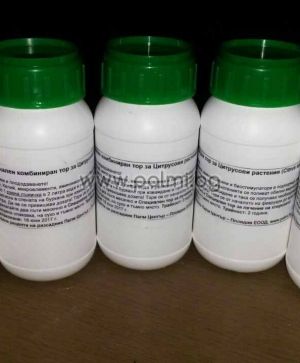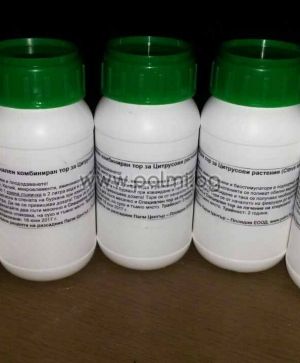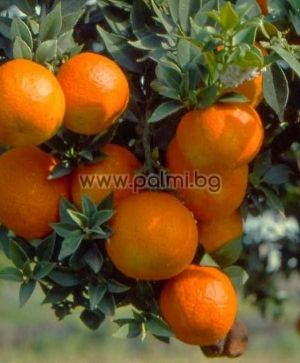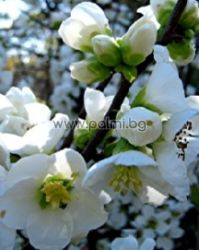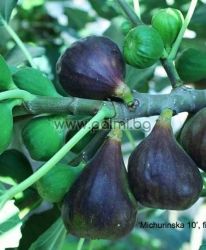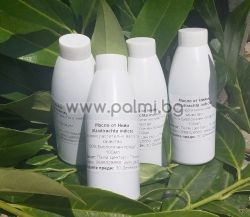Other Citrus plants
Other Citrus plants of the Citrus genus and the family Rutaceae.
Bergamot orange
Important notice! Most citrus plants on the market are produced for planting in orchards in the Mediterranean countries. They have a large overall height, have high graft and are difficult to shape and support at home. Rootstocks on which they are grafted are very fast growing, which is fine for the open ground in the subtropics, but is not desirable when growing in pot in the temperate climate.
All our small citrus plants are produced specifically for the Bulgarian market and are ideally suited for home cultivation. The rootstocks cause compact growth, grafts are low and this allows making an excellent shape of the crown, to be suitable for growing in pots. The used rootstocks are trifoliate orange (Poncirus trifoliata 'Flying Dragon') and Volkamer lemon, Citrus volkameriana. Trifoliate orange is frost-hardy to -25°C, and significantly increases the cold resistance of plants grafted on it.
Citrus bergamia, Bergamot orange
from Botanical Garden - Plovdiv, Bulgaria
Bergamot orange is one of the most famous Citrus species, due to the expensive Bergamot oil, which is produced from its fruits. They are also used in medicine, in many recipes (even in the production of Turkish delight in southern Turkey), and in some countries a Bergamot juice drink is quite popular.
All parts of the plant (flowers, leaves, twigs) have strong and distinctive exotic aroma, which is very valuable in perfumery.
Like all citrus, Bergamot orange should be protected from spider mites and scale insects.
It should be overwintered at temperatures below +10 degrees Celsius! At higher temperatures, the leaves will usually fall off. During the summer the plants should be outside, fertilized and watered regularily.
Much more information about Bergamot and all other Citrus varieties is available in Bulgarian in our forum:
Availability: 11 pcs
Chinoto
Citrus myrtifolia, Chinoto
This is an interesting citrus of high ornamental value. It bears fruits that resemble mandarins. On the background of the tiny leaves, they stand out and the plant looks like covered by fruits. Regardless of their acidic taste, the fruits are used in many ways, especially in southern Italy, where they are used as a spice in a variety of local drinks, for example Campari.
Availability: 32 pcs
Yuzu (Japanese Citron)
Citrus junos, Yuzu (Japanese Citron)
Yuzu citron originated thousands of years ago in China as a natural hybrid between mandarin and Ichang papeda, from which it inherited its great cold hardiness. It produces edible fruits that are widely used in Japanese and Korean cuisine. In addition to their thousands of applications for juices, tea, cooking sauces, jams and even vinegar, the fruits can simply be used as a substitute for lemons in our kitchen. Their juice is fragrant and sour, with very pleasant notes.
When grafted on Poncirus trifoliata rootstock, this type of citrus plant can withstand without serious damage to about -12° C, and the plants can freeze to the ground with a long-term drop in temperature to -15° C or more. Even after dying to ground level, they recover quickly in the spring.
Yuzu citron can be grown without any protection on the southern Black Sea coast and in the warmer parts of southern Bulgaria, where figs do not freeze and are large trees. In other parts of the country, Yuzu can be grown with more or less winter protection, because unprotected plants will freeze to the ground too often and will not bear fruit.
The mother plant we use for propagation has been growing in Asenovgrad since 2004 and is currently a tree over 3 meters high. The last time it was damaged was in February 2012 and it now bears abundant fruit crops every year.
More information about this plant can be found in our forum (select your language at the top right there): http://forum.palmi.bg/viewtopic.php?f=4&t=1744
Availability: 2 pcs
Calamondin, the perfect ornamental citrus
Important notice! Most citrus plants on the market are produced for planting in orchards in the Mediterranean countries. They have a large overall height, have high graft and are difficult to shape and support at home. Rootstocks on which they are grafted are very fast growing, which is fine for the open ground in the subtropics, but is not desirable when growing in pot in the temperate climate.
All our small citrus plants are produced specifically for the Bulgarian market and are ideally suited for home cultivation. The rootstocks cause compact growth, grafts are low and this allows making an excellent shape of the crown, to be suitable for growing in pots. The used rootstocks are trifoliate orange (Poncirus trifoliata 'Flying Dragon') and Volkamer lemon, Citrus volkameriana. Trifoliate orange is frost-hardy to -25°C, and significantly increases the cold resistance of plants grafted on it.
Citrofortunella mitis, Calamondin, the perfect ornamental citrus from Botanical Garden - Plovdiv, Bulgaria
If you want a mandarin plant, which blooms all year round and freshens the air with a pleasant fragrance, to set fruits throughout the year, and is laden with ripe fruit throughout the year, the Calamondin should be your choice. This is probably the best ornamental citrus. Fruits are sour but as they stay on the tree all year round, usually they are left for decoration.
As with all other Citrus plants, the Calamondin is susceptible to scales and spider mites and needs to be sprayed twice a year.
In winter it will need a cool place with temperatures 0-10 degrees Celsius. If the temperature is higher, the leaves usually fall off. In summer it needs to be outside and abundantly watered.
Much more information about all citrus species is available on our forum:
Availability: 1 pcs
200 g fertilizer for treatment of chlorosis
Fertilizer concentrate for chlorosis treatment
Special blend, prevents the appearance of yellow new leaves, treats long-lasting chlorosis, supports quality growth
Ingredients: Iron salts, magnesium salts, acidifying ions, additional minerals.
Application: Dissolve 1 tablespoon in 1 gallon of tap water and water the plants abundantly every 2 to 4 weeks. In case of severely damaged plants, apply the fertilizer every 2 weeks until green and quality new growth is developped! Could be applied all year round to potted plants. Use with caution to avoid rust spots on any surrounding surfaces! Please note, that this fertilizer will affect mostly the new growth, not the old leaves that are already damaged. Do not overdose!
Storage: In a tightly closed package, in a dry and dark place. Durability: 2 years.
Net: 7 oz (200 gr)
Own recipe of the nursery Palm Center-Plovdiv Ltd., Bulgaria, www.palmi.bg
Availability: 14 pcs
Chinoto
Citrus myrtifolia, Chinoto
This is an interesting citrus of high ornamental value. It bears fruits that resemble mandarins. On the background of the tiny leaves, they stand out and the plant looks like covered by fruits. Regardless of their acidic taste, the fruits are used in many ways, especially in southern Italy, where they are used as a spice in a variety of local drinks, for example Campari.
Availability: 5 pcs

